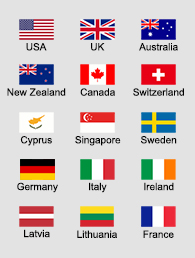For bright international students, attending university in Sweden has never been easier: exchange programs for undergraduates are widely available, and graduate students can now choose from over 200 English-language master’s programs, ranging from bioinformatics to human rights law to space engineering.The result is that more non-Swedes than ever before are coming to Sweden to study.
During the 2002-2003 academic year, around 10,500 of 83,000 new enrolments at Swedish universities, or some 12.5%, were by non-nationals, according to latest figures by the National Agency for Higher Education; that’s almost double the number just five years ago. This trend is being encouraged both by the government and by universities themselves, because they consider an international student body to be an asset for all students.
Of the 200 master’s programs available today, around 40 percent are in the natural sciences, technology or engineering – fields that have been the most thoroughly anglicized globally.
Around 20 percent of programs are in the area of business and economics.
Other master’s programs offer degrees in the social sciences, art and design, health and medicine, law, and the humanities.
A commitment to quality
Sweden has a history of academic excellence that stretches back to the 15th century, and the country is home to the Nobel Prize, the world’s most prestigious academic distinction. But its universities don’t have to rest on these laurels: contemporary factors support Sweden’s reputation for quality in higher education.
First, there is a commitment by the state to making sure the universities are well endowed. Of all OECD countries, Sweden invests the most per student in higher education: latest available figures show that total spending per student over the course of a typical Swedish university education amounts to nearly $70,000, versus an OECD average of $40,000.
Then, the National Agency for Higher Education implements what is widely regarded to be one of the world’s most stringent evaluation procedures. Some 300 assessors, many from abroad, continuously evaluate a total of 700 programs at Sweden’s 39 degree-awarding academic institutions. They have the power to strip a university of its entitlement to award degrees, which means that individual (departmental) deans are very proactive in their own quality assessments. The results, moreover, are published in English, making the process fully transparent.
Cooperation with industry
In the fields of science and technology, Swedish universities have a symbiosis with industry, an arrangement that began during the industrialization of the economy in the 19th century. Many of Sweden’s large companies were built around ideas developed by publicly funded research. Today, universities are the epicenters for many of Sweden’s technology clusters; Mobile Valley in Kista , a suburb of Stockholm, Telematics Valley in Göteborg, and Öresund IT, in the Öresund region - an area composed of eastern Denmark and southern Sweden, all feed off a fount of academic talent.
But the collaboration works both ways – students get valuable real-world training, and research projects focus on where the most promising growth lies. Publicly funded incubators, such as Netport Karlshamn in Blekinge, in the south-east, help graduate students turn their innovations into viable businesses.
Informal approaches
Swedish universities employ a teaching methodology that is distinctly less hierarchical and more hands-on than in most other countries. The focus is less on note taking in lectures than on project-based learning and problem solving, as well as independent research that fosters initiative and critical thinking.
For Tina Fransson, this is something new and different, and a great learning experience: “There have been so many written reports and oral presentations, which was great because it prepared me for real life in the workplace,” she says. The informal atmosphere puts student-teacher interaction on a much more egalitarian footing, which for students means more chances to pick a teacher’s brain. “I have talked quite a lot to teachers with whom I have similar interests,” says Andy Fugard.
Education is free
The Swedish state fully funds university tuition (with the exception of a few private institutions) for all students, regardless of their provenance. This means that education is free for all those who are accepted into a program. Non-Swedes have no recourse to student loans, but various organizations, including the Swedish Institute, provide limited, competitive scholarships to cover living costs.
For the future, in the context of a Europe-wide academic standardization effort called The Bologna Process, the government is considering implementing fees for students from outside the EU, but until 2007 at least, the cost of admission remains just academic excellence.
Further reading
The Swedish Institute maintains a website,
www.studyinsweden.se, aimed at encouraging international students to study in Sweden. It contains a database of English-language programs, information on application procedures, scholarships and visas, and the answers to many frequently asked questions.






